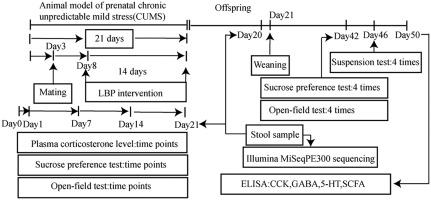Biomedicine & Pharmacotherapy ( IF 6.9 ) Pub Date : 2021-08-31 , DOI: 10.1016/j.biopha.2021.112087 Feng Zhao 1 , Suzhen Guan 1 , Youjuan Fu 1 , Kai Wang 1 , Zhihong Liu 1 , Tzi Bun Ng 2

|
Stress during pregnancy is not only detrimental to a woman's own physical and mental health, but can also cause changes in the intrauterine environment and even have an impact on later growth and development, this study was designed to understand the changes of gut microbiota in the maternal and offspring caused by prenatal chronic stress, and to explore the regulatory effect of LBP on gut microbiota, and then to improve the emotional damage caused by prenatal chronic stress in the offspring. A rat model of prenatal chronic stress was made and used LBP to intervene by gavage. Fresh feces of offspring were collected, the concentration of microbial metabolites were tested by ELISA. Illumina MiSeqPE300 sequencing technology was used to determine the sequence of 16S rRNA V3-V4 of microorganisms. On the PND 42, the emotional function of offspring were tested by open-field test (OFT), sucrose preference test (SPT) and tail of suspend test (TST). Results indicated that stress factors increased the plasma corticosterone level of rats during pregnancy and they appeared depressive behaviors. The body weight of offspring during prenatal chronic stress was lower than the control group, and the plasma corticosterone level was increased. Prenatal chronic stress had a significant impact on emotional performance of the offspring on OFT, SPT and TST. Alpha diversity of gut microbiota and microbiota composition in offspring of prenatal chronic stress was attenuated and some relationships existed between these parameters. LBP treatment reduced offspring’s plasma corticosterone level and improved their body weight, changed the emotional function, increased the diversity of gut microbiota. Collectively, these findings disclose that prenatal chronic stress not only causes emotional injury on the offspring, but also changes the gut microbiota of the mother and offspring; LBP may regulate the intestinal flora of the mother, then reducing the influence of stress factors on the emotional injury of offspring.
中文翻译:

枸杞多糖通过调节肠道菌群减轻大鼠产前慢性应激引起的子代情绪损伤
怀孕期间的压力不仅不利于女性自身的身心健康,还会引起宫内环境的变化,甚至对后期的生长发育产生影响,本研究旨在了解母体肠道菌群的变化。探讨腰痛对肠道菌群的调节作用,进而改善产前慢性应激对子代造成的情绪损伤。建立产前慢性应激大鼠模型,并采用腰痛灌胃干预。收集仔鼠新鲜粪便,采用ELISA法检测微生物代谢物浓度。采用Illumina MiSeqPE300测序技术测定微生物16S rRNA V3-V4序列。在PND 42上,通过旷场测试(OFT)、蔗糖偏好测试(SPT)和悬尾测试(TST)测试子代的情绪功能。结果表明,应激因素使妊娠期大鼠血浆皮质酮水平升高,并出现抑郁行为。产前慢性应激时子代体重低于对照组,血浆皮质酮水平升高。产前慢性应激对后代OFT、SPT和TST情绪表现有显着影响。产前慢性应激后代肠道微生物群的α多样性和微生物群组成减弱,并且这些参数之间存在一定的相关性。 LBP治疗降低了子代的血浆皮质酮水平,改善了他们的体重,改变了情绪功能,增加了肠道微生物群的多样性。 总的来说,这些发现表明,产前慢性压力不仅会对后代造成情绪伤害,还会改变母亲和后代的肠道微生物群。腰痛可以调节母体肠道菌群,从而减少应激因素对子代情绪伤害的影响。































 京公网安备 11010802027423号
京公网安备 11010802027423号